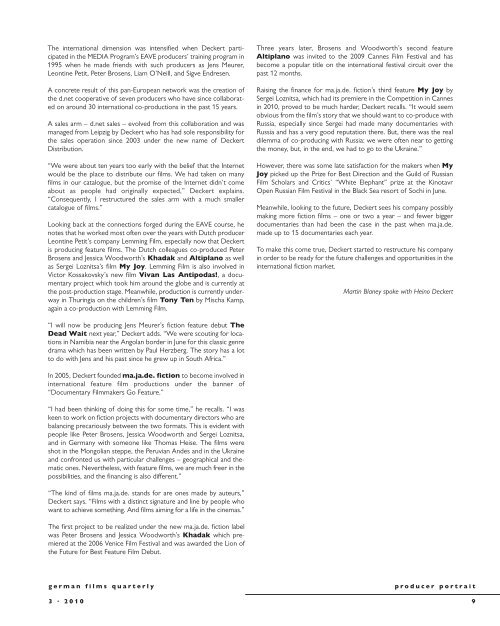German Films
German Films
German Films
You also want an ePaper? Increase the reach of your titles
YUMPU automatically turns print PDFs into web optimized ePapers that Google loves.
The international dimension was intensified when Deckert parti -<br />
cipated in the MEDIA Program’s EAVE producers’ training program in<br />
1995 when he made friends with such producers as Jens Meurer,<br />
Leontine Petit, Peter Brosens, Liam O’Neill, and Sigve Endresen.<br />
A concrete result of this pan-European network was the creation of<br />
the d.net cooperative of seven producers who have since collaborat -<br />
ed on around 30 international co-productions in the past 15 years.<br />
A sales arm – d.net sales – evolved from this collaboration and was<br />
managed from Leipzig by Deckert who has had sole responsibility for<br />
the sales operation since 2003 under the new name of Deckert<br />
Distribution.<br />
“We were about ten years too early with the belief that the Internet<br />
would be the place to distribute our films. We had taken on many<br />
films in our catalogue, but the promise of the Internet didn’t come<br />
about as people had originally expected,” Deckert explains.<br />
“Consequently, I restructured the sales arm with a much smaller<br />
catalo gue of films.”<br />
Looking back at the connections forged during the EAVE course, he<br />
notes that he worked most often over the years with Dutch pro ducer<br />
Leontine Petit’s company Lemming Film, especially now that Deckert<br />
is producing feature films. The Dutch colleagues co-produced Peter<br />
Brosens and Jessica Woodworth’s Khadak and Altiplano as well<br />
as Sergei Loznitsa’s film My Joy. Lemming Film is also involved in<br />
Victor Kossakovsky’s new film Vivan Las Antipodas!, a documentary<br />
project which took him around the globe and is currently at<br />
the post-production stage. Meanwhile, production is currently underway<br />
in Thuringia on the children’s film Tony Ten by Mischa Kamp,<br />
again a co-production with Lemming Film.<br />
“I will now be producing Jens Meurer’s fiction feature debut The<br />
Dead Wait next year,” Deckert adds. “We were scouting for locations<br />
in Namibia near the Angolan border in June for this classic genre<br />
drama which has been written by Paul Herzberg. The story has a lot<br />
to do with Jens and his past since he grew up in South Africa.”<br />
In 2005, Deckert founded ma.ja.de. fiction to become involved in<br />
international feature film productions under the banner of<br />
“Documentary Filmmakers Go Feature.”<br />
“I had been thinking of doing this for some time,” he recalls. “I was<br />
keen to work on fiction projects with documentary directors who are<br />
balancing precariously between the two formats. This is evident with<br />
people like Peter Brosens, Jessica Woodworth and Sergei Loznitsa,<br />
and in <strong>German</strong>y with someone like Thomas Heise. The films were<br />
shot in the Mongolian steppe, the Peruvian Andes and in the Ukraine<br />
and confronted us with particular challenges – geographical and thematic<br />
ones. Nevertheless, with feature films, we are much freer in the<br />
possibilities, and the financing is also different.”<br />
“The kind of films ma.ja.de. stands for are ones made by auteurs,”<br />
Deckert says. “<strong>Films</strong> with a distinct signature and line by people who<br />
want to achieve something. And films aiming for a life in the cinemas.”<br />
The first project to be realized under the new ma.ja.de. fiction label<br />
was Peter Brosens and Jessica Woodworth’s Khadak which premiered<br />
at the 2006 Venice Film Festival and was awarded the Lion of<br />
the Future for Best Feature Film Debut.<br />
Three years later, Brosens and Woodworth’s second feature<br />
Altiplano was invited to the 2009 Cannes Film Festival and has<br />
become a popular title on the international festival circuit over the<br />
past 12 months.<br />
Raising the finance for ma.ja.de. fiction’s third feature My Joy by<br />
Sergei Loznitsa, which had its premiere in the Competition in Cannes<br />
in 2010, proved to be much harder, Deckert recalls. “It would seem<br />
obvious from the film’s story that we should want to co-produce with<br />
Russia, especially since Sergei had made many documentaries with<br />
Russia and has a very good reputation there. But, there was the real<br />
dilemma of co-producing with Russia: we were often near to getting<br />
the money, but, in the end, we had to go to the Ukraine.”<br />
However, there was some late satisfaction for the makers when My<br />
Joy picked up the Prize for Best Direction and the Guild of Russian<br />
Film Scholars and Critics’ “White Elephant” prize at the Kinotavr<br />
Open Russian Film Festival in the Black Sea resort of Sochi in June.<br />
Meanwhile, looking to the future, Deckert sees his company possibly<br />
making more fiction films – one or two a year – and fewer bigger<br />
documentaries than had been the case in the past when ma.ja.de.<br />
made up to 15 documentaries each year.<br />
To make this come true, Deckert started to restructure his company<br />
in order to be ready for the future challenges and opportunities in the<br />
international fiction market.<br />
Martin Blaney spoke with Heino Deckert<br />
german films quarterly producer portrait<br />
3 · 2010 9

















